2008年高考英语试题(湖北卷)(完整版)
高考英语湖北卷听力原文2008年

2008年高考英语湖北卷听力第一部分:听力(共两节,满分30分)第一节(共5 小题;每小题1.5分,满分7.5分)听下面5段对话。
每段对话后有一个小题,从题中所给的A、B、C三个选项中选出最佳选项,并标在试卷的相应位置。
听完每段对话后,你都有10秒钟的时间来回答有关小题和阅读下一小题。
每段对话仅读一遍。
1. Where does the conversation most probably take place?A. In an office.B. In a library.C. In a bookstore.2. Where did the speakers plan to go?A. A shopping center.B. An opera house.C. The parking lot.3. Which aspect of the film does the woman like?A. The plot.B. The music.C. The dialogue.4. What do we know about the woman’s jacket?A. It is sold at a lower price.B. Its color is her favorite.C. It is her sister’s size.5. What does the woman imply?A. The man is so forgetful.B. The man is too careless.C. The man is over confident.第二节(共15 小题;每小题1.5分,满分22.5分)听下面5段对话或独白。
每段对话或独白后有几个小题,从题中所给的A、B、C三个选项中选出最佳选项,并标在试卷的相应位置。
听完每段对话或独白前后,你将有时间阅读各个小题,每小题5秒钟;听完后,各小题将给出5秒钟的作答时间。
2008年高考英语试题及参考答案(湖北卷)
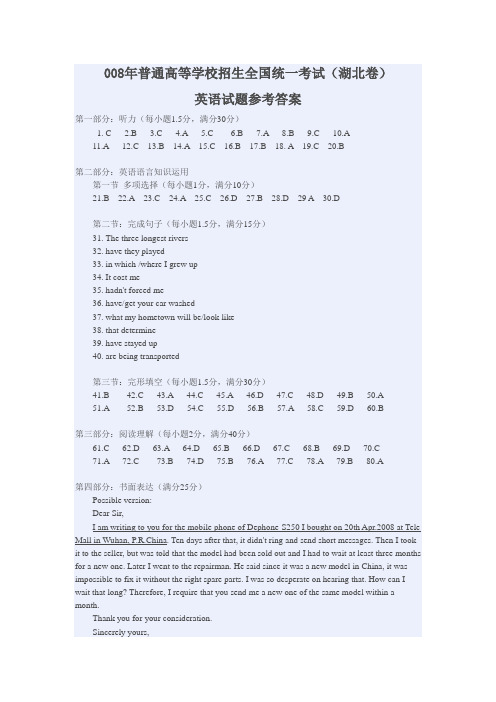
008年普通高等学校招生全国统一考试(湖北卷)英语试题参考答案第一部分:听力(每小题1.5分,满分30分)1. C2.B3.C4.A5.C6.B7.A8.B9.C 10.A11.A12.C 13.B 14.A15.C 16.B 17.B 18. A19.C 20.B第二部分:英语语言知识运用第一节多项选择(每小题1分,满分10分)21.B 22.A23.C 24.A25.C 26.D 27.B 28.D 29 A30.D第二节:完成句子(每小题1.5分,满分15分)31. The three longest rivers32. have they played33. in which /where I grew up34. It cost me35. hadn't forced me36. have/get your car washed37. what my hometown will be/look like38. that determine39. have stayed up40. are being transported第三节:完形填空(每小题1.5分,满分30分)41.B 42.C 43.A44.C 45.A46.D 47.C 48.D 49.B 50.A51.A52.B 53.D 54.C 55.D 56.B 57.A58.C 59.D 60.B第三部分:阅读理解(每小题2分,满分40分)61.C 62.D 63.A64.D 65.B 66.D 67.C 68.B 69.D 70.C71.A72.C 73.B 74.D 75.B 76.A77.C 78.A79.B 80.A第四部分:书面表达(满分25分)Possible version:Dear Sir,I am writing to you for the mobile phone of Dephone-S250 I bought on 20th Apr.2008 at Tele Mall in Wuhan, P.R.China. Ten days after that, it didn't ring and send short messages. Then I took it to the seller, but was told that the model had been sold out and I had to wait at least three months for a new one. Later I went to the repairman. He said since it was a new model in China, it was impossible to fix it without the right spare parts. I was so desperate on hearing that. How can I wait that long? Therefore, I require that you send me a new one of the same model within a month.Thank you for your consideration.Sincerely yours,Bu Manyi。
2008年高考英语试题及参考答案(湖北卷)
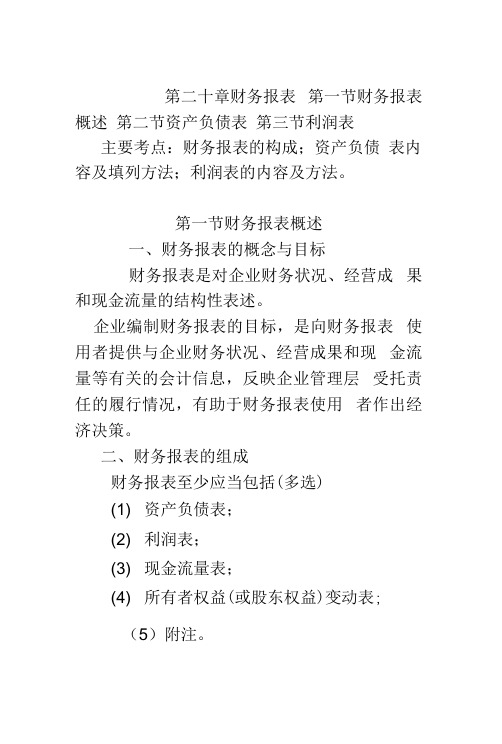
第二十章财务报表第一节财务报表概述第二节资产负债表第三节利润表主要考点:财务报表的构成;资产负债表内容及填列方法;利润表的内容及方法。
第一节财务报表概述一、财务报表的概念与目标财务报表是对企业财务状况、经营成果和现金流量的结构性表述。
企业编制财务报表的目标,是向财务报表使用者提供与企业财务状况、经营成果和现金流量等有关的会计信息,反映企业管理层受托责任的履行情况,有助于财务报表使用者作出经济决策。
二、财务报表的组成财务报表至少应当包括(多选)(1) 资产负债表;(2) 利润表;(3) 现金流量表;(4) 所有者权益(或股东权益)变动表;(5)附注。
资产负债表是反映企业在某一特定日期财务状况的报表。
利润表是反映企业在一定会计期间经营成果的报表。
现金流量表是反映企业在一定会计期间现金流动情况的报表。
所有者权益变动表是反映组成所有者权益的各组成部分当期的增减变动情况的报表。
附注是财务报表不可或缺的组成部分,是对报表的文字描述或明细资料,以及对未能在这些报表中列示项目的说明等。
1. (多)财务会计目标是通过编制财务报告,借以反映企业的()。
A. 成本费用B. 经营成果C. 财务状况D. 现金流量2. (多)企业财务会计报表的内容包括()。
A. 附注B. 现金流量表C. 资产负债表D. 利润表三、财务报表的分类1. 按照财务报表的编报时间,可以分为中期财务报表和年度财务报表。
2. 按照财务报表反映财务活动方式的不同,可以分为静态财务报表和动态财务报表。
静态财务报表指反映企业特定时点上有关资产、负债和所有者权益情况的财务报表,一般应根据各个账户的 "期末余额”填列;动态财务报表指反映企业一定时期内资金耗费和收回情况以及经营成果的财务报表,一般应根据有关账户的“发生额”填列。
3. 按照财务报表的服务对象,可以分为外部报表和内部报表。
外部报表按企业会计准则和有关的会计准则编制的,有统一的格式和指标体系;内部报表,又称为管理报表,则是为了适应企业内部经营管理的需要,自行设计、编制的报表,没有统一规定的格式和指标体系。
高中英语2008年湖北省黄冈、襄樊、孝感、宜昌、荆州高三联合考试试题
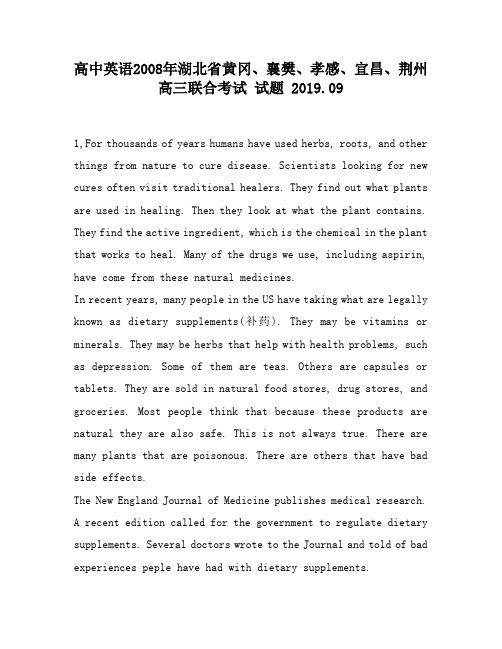
高中英语2008年湖北省黄冈、襄樊、孝感、宜昌、荆州高三联合考试试题 2019.091,For thousands of years humans have used herbs, roots, and other things from nature to cure disease. Scientists looking for new cures often visit traditional healers. They find out what plants are used in healing. Then they look at what the plant contains. They find the active ingredient, which is the chemical in the plant that works to heal. Many of the drugs we use, including aspirin, have come from these natural medicines.In recent years, many people in the US have taking what are legally known as dietary supplements(补药). They may be vitamins or minerals. They may be herbs that help with health problems, such as depression. Some of them are teas. Others are capsules or tablets. They are sold in natural food stores, drug stores, and groceries. Most people think that because these products are natural they are also safe. This is not always true. There are many plants that are poisonous. There are others that have bad side effects.The New England Journal of Medicine publishes medical research.A recent edition called for the government to regulate dietary supplements. Several doctors wrote to the Journal and told of bad experiences peple have had with dietary supplements.Dietary supplements aren't tested in the same way as drugs. There is not always proof that the supplement really does what it is supposed to do. There is also a problem with purity of the supplements. Supplements have been found to contain things that are bad for the body. For example, the California Department of Health found that of 260 herbs grown in China, one third contained heavy metals. These are minerals such as lead and mercury(水银). They are very poisonous, even in tiny amounts.1. The scientists study the cures from the healers in order to _______.A. find out if the plant is poisonousB. find out what in the plant works to cure diseaseC. look for aspirin in the plantD. make sure that the plant can cure disease2. We can infer from the second paragraph that _______.A. it is legal to take dietary supplement in the USAB. supplements are safe because they are natural medicines.C. all the supplements are poisonousD. none of the supplements has bad side effects3. The underlined word “regulate” in the third paragraph means _______.A. punishB. removeC. controlD. manage4. The problem with dietary supplement may be in that _______.A. the supplements can’t be tested like drugsB. the supplements may contain something uselessC. the supplements may be polluted seriouslyD. there is no clear evidence that the supplement does work well5. Which one of the following is NOT right according to this passage?A. Scientists think herbs, roots can be used to cure disease.B. People believe dietary supplements contains vitamins and minerals.C. It is right that the dietary supplements are always safe.D. Dietary supplements are harmful to your health.2,If you were walking around a supermarket and saw a woman with a shaved head, a ring through her nose, a tatoo design on her arm and she has a small child in her shopping trolley, what would your opinion be? Do you think this kind of body decoration is attractive or ugly? Different people have different ideas. The following are some examples of body decoration from around the world.In many parts of Africa, it is thought that an attractive girl should have really shinny skin.On Bali, a little island in Indonesia, they believe that a beautiful woman or handsome man must have perfectly straight, flat teeth. The Balinese believe that teeth with pointed edges make you look like an ugly wild animal. So when a girl or boy becomes a teenager, he or she is taken to a special person in their villagewho will file off teeth points to make them smooth and flat. There is no anesthetic and this tooth filing is really painful. It is a kind of test. If you can stand it without screaming or crying too much, then you are thought ready to become an adult.In Myanmar, there is a small group of people who are called the “Padaung”. They believe that a woman can only be really beautiful if she has a long neck. I mean a VERY long neck. Now you might think that you are either born with a long or short neck and that there’s nothing whatever you can do about it. But you would be wrong! At around the age of 5, a Papaung girl has heavy metal rings fitted around her neck, tightly between the chin and shoulders. Each year more rings are added and very, very slowly their weight pushes the shoulders down, in this way making the neck look longer. A Papaung woman will wear her neck rings all her life, never once taking them off.So now I’m sure you will all agree that different people have different ideas about what is beautiful.1. What is mainly talked about in paragraph one?A. Women’s design.B. Beautiful body decoration.C. Attractive decoration.D. Body decoration.2. What does the underlined word “trolley” mean?A. handbagB. luggage.C. shopping cartD. basket3. On Bali, it is believed that _________.A. a person with sharp teeth looks uglyB. a person with straight, flat teeth looks uglyC. a teenager’s teeth points must be filed off with anestheticD. no one will scream or cry when having his teeth points filed off4. Which of the following is NOT true?A. Most African people think that a girl with shinny skin is beautiful.B. Many people think that a woman with a ring through nose is neither attractive nor ugly.C. It is thought that a beautiful woman should have straight, flat teeth on Bali.D. Some people think it beautiful that a woman has a long neck in Myanmar.5. What is the best title of the passage?A. Who is a beautiful woman?B. What is beautiful?C. Different ideas about beautiful.D. Body Decoration.3,A. Commemorative show: To mark the 100th anniversary of the birth of Norwegian playwright Henrik Ibsen, the founder of modern prose drama, a concert titled "Nora's Songs" will be given. Time: 7:30 pm, March 20Place: Peking University Concert HallTel: 6275-2279, 6275-9637B. Feel the mood: Jonathan Lee will host his 2006 concert in Beijing. As the master of music in Taiwan, Lee is famous for his unique annotation of love, mood and life.Time: 7:30 pm, March 24, 25Place: Capital Gymnasium, Baishiqiao Lu, Haidian District Tel: 6835-4020C. Chamber music: The chamber concert series of China Philharmonic Symphony Orchestra will greet audiences with a woodwind quintet, a string quartet plus Bach's piano concerto and suite. Time: 7:30 pm, March 25Place: The Concert Hall of the Central Conservatory of Music, 43 Baojiajie, Xicheng DistrictTel: 6641-4759, 6642-5744D. Pop star: Singer and composer Emil Chau, one of the most admired music idols in China and Southeast Asia, will perform a solo concert in Beijing. Chau was born in Hong Kong and attended college in Taiwan. He has released more than 30 albums in Mandarin, Cantonese and English.Time: 7:30 pm, March 31Place: Capital Gymnasium, Baishiqiao Lu, Haidian District Tel: 6833-5552E. Music for children: Some 50 colourful music-related performances will be staged until August 28 in an "Open the Doorto Music" series of concerts, in a move to foster Chinese children's taste for art. The concert series will be held in several venues, sponsored by the Forbidden City Concert Hall and supported by the Beijing Municipal Culture Bureau.Tickets: 10-100 yuan (US$1-12)Time/date: 2 pm or 7:30 pm, July 20-August 28Location: mainly in the Forbidden City Concert Hall in Zhongshan Park, some in Peking University Hall in Haidian District and in the China Puppet Art Theatre and Poly TheatreTel: 6506-5343, 6506-5345F. Beautiful timbre: Jasmine Leong will meet her Beijing fans next month. Singing with beautiful timbre, Leong will present a series of love stories to the audience. To highlight the theme of love, 200 sets of lover's tickets, valued at 1800 yuan will be presented. Tickets: 180-980 yuan (US$22-121)Time/date: 7:30 pm, September 9Location: Workers' Gymnasium, Gongti Beilu, Chaoyang District Tel: 6501-6655以下内容是与演唱会相关的信息,请匹配与之相关的演唱会。
08年湖北高考英语真题答案

08年湖北高考英语真题答案听力原文材料1.M: Excuse me. Is this dictionary available?W: Ur... Oxford Learners Dictionary, the seventh edition? I am sorry. It's sold out.M: Oh, that's too bad.材料2.W: Did you see the purse, honey?M: Your purse? No. Why the purse? We're not going shopping anyway.W: I know. But our opera tickets are in it. And we have only one hour left.M: Did you have it when we left the parking lot?材料3.M: What do you think of the film, Ellen?W: Well, the plot is not so good.M: But the music...W: The music is just so-so. Anyway, the dialogue is humorous.材料4.M: You look smart in this red jacket.W: Thank you. A really good bargain, I think. You can get one for your sister. It goes on sale today. M: Yes, but I dont't know what size she takes.材料5.W: Hi, John. How is your exam?M: It couldn't be better.W: Really? But remember this: hope for the best and be prepared for the worst.材料6.W: You look tired.M: Yeah, I am worn out. I've been surfing the Internet.W: Were you doing school work or playing games?M: Well, I wanted to get some information about Canada for my project, but I found a really interesting chat room with people from that country and started chatting.W: Did you get the information you needed?M: Yes, but then we spent a lot of time chatting about other interests.材料7.M: I hear a businessman is building a dog park in our city.W: Really? What for?M: Obviously because there's a law against having dogs in the streets.W: Does it mean that dogs have to stay at home all the time?M: Sounds pretty cruel, right? Maybe a dog park is a good idea.W: Maybe they should just allow people to walk their dogs in the streets.M: But then streets could be a mess.W: Couldn't people clean up after their dogs?M: Would they?材料8.W: Mr. Parker, when did you arrive home yesterday evening?M: At about 8 o'clock.W: What did you do right after you entered your flat?M: Well, I washed my hands and then watched sports news.W: When did you have supper?M: At about a quarter to nine, I guess.W: Did you stay at home all evening?M: Yes.W: But your friend says that he found you several times between 8 and 9. But you didn't answer. M: Well, I think I was in the bath at that time.W: No, you weren't. You were not even at home last night. You robbed a bank in James Street.材料9.M: Hi, mom.W: There you are. I'm getting worried. It's so late.M: Yes. I ran into Linda and we went to a pub. She told me a funny thing.W: Oh? What was that?M: Well, she was driving home after work, and she suddenly saw an old lady on her hands and knees in the middle of the road.W: Really?M: Yes, Linda was so shocked that she stopped suddenly and the car behind crashed into hers. W: Was she hurt?M: No.W: And what was the old lady doing?M: I am just coming to that. So Linda got out of her car and saw the old lady pick up something and walk away.W: Lucky indeed. Linda didn't run her over.M: Then a policeman came. But he didn't believe what Linda said.W: Well...M: Luckily there was a witness, a man waiting for a bus. He saw it all. Guess what the old lady was doing?W: I haven't the slightest idea.M: She was looking for her gold tooth.W: A gold tooth?M: Yes, it fell out as she was crossing the road. The witness heard her saying, "Oh, my gold tooth..."材料10.In my spoken English class, I asked the students about their impressions of their university life. To my surprise, many of them expressed disappointment. After their highly controlled high school lives, they were having difficulty adjusting to the free time in the university. When I asked them to describe their high school lives, many of them told me they got up at six in the morning and studied until ten at night. Most of this time was spent at school, doing piles of homework to help them prepare for the university entrance exams.Once they entered the university, in my opinion, the students are not expected to devote all their waiting hours to studying. They should also take an active part in social activities. Therefore, they should learn to divide their time outside of the class between sports and clubs. What's more, they should spend some time watching TV and chatting with their roommates. These activities are useful in helping them prepare for their future. But what struck me most was that many of them did not seem particularly happy about their new found freedom. As they had so many choices, they felt that no matter what they were doing, they should be doing something else. That's why they were not happy.To those students, my advice was, get used to it and learn to make decisions for yourselves.第一部分:听力1.C2.B3.C4.A5.C6.B7.A8.B9.C 10.A 11.A 12.C 13.B 14.A 15.C 16.B 17.B 18.A 19.C 20.B 第二部分:英语语言知识运用第一节:多项选择21.B 22.A 23.C 24.A 25.C 26.D 27.B 28.D 29.A 30.D 第二节:完成句子31. The three longest rivers32. have they played33. in which where I grew up34. It cost me35. hadn’t forced me36. have/get your car washed37. what my hometown will be/look like38.that determine39. have stayed up40. are being transported第三节:完形填空41.B 42.C 43.A 44.C 45.A 46.D 47.C 48.D 49.B 50.A 51.A 52.B 53.D 54.C 55.D 56.B 57.A 58.C 59.D 60.B 第三部分:阅读理解61.C 62.D 63.A 64.D 65.B 66.D 67.C 68.B 69.D 70.C 71.A 72.C 73.B 74.D 75.B 76.A 77.C 78.A 79.B 80.A 第四部分:书面表达Possible version:Dear Sir,I am writing to you for the mobile phone of Dephone-S250 I bought on 20th Apr.2008 at Tele Mall in Wuhan, P.R. China. Ten days after that, it didn’t ring and send short messages. Then I took it to the seller, but was told that the model had been sold out and I had to wait at least three months for a new one. Later I went to the repairman. He said since it was a new model in China,it was impossible to fix it without the right spare parts.I was so desperate on hearing that.How can I wait that long? Therefore, I require that you send me a new one of the same model within a month.Thank you for your consideration.Sincerely yours,Bu Manyi。
2008年高考英语试题及答案
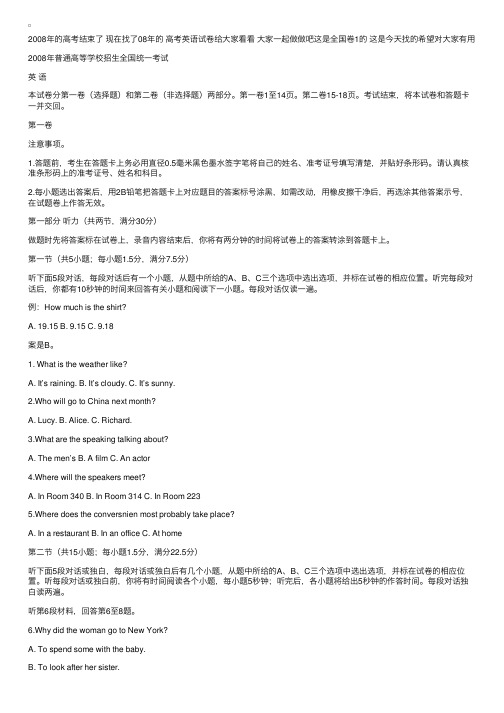
2008年的⾼考结束了现在找了08年的⾼考英语试卷给⼤家看看⼤家⼀起做做吧这是全国卷1的这是今天找的希望对⼤家有⽤2008年普通⾼等学校招⽣全国统⼀考试英语本试卷分第⼀卷(选择题)和第⼆卷(⾮选择题)两部分。
第⼀卷1⾄14页。
第⼆卷15-18页。
考试结束,将本试卷和答题卡⼀并交回。
第⼀卷注意事项。
1.答题前,考⽣在答题卡上务必⽤直径0.5毫⽶⿊⾊墨⽔签字笔将⾃⼰的姓名、准考证号填写清楚,并贴好条形码。
请认真核准条形码上的准考证号、姓名和科⽬。
2.每⼩题选出答案后,⽤2B铅笔把答题卡上对应题⽬的答案标号涂⿊,如需改动,⽤橡⽪擦⼲净后,再选涂其他答案⽰号,在试题卷上作答⽆效。
第⼀部分听⼒(共两节,满分30分)做题时先将答案标在试卷上,录⾳内容结束后,你将有两分钟的时间将试卷上的答案转涂到答题卡上。
第⼀节(共5⼩题;每⼩题1.5分,满分7.5分)听下⾯5段对话,每段对话后有⼀个⼩题,从题中所给的A、B、C三个选项中选出选项,并标在试卷的相应位置。
听完每段对话后,你都有10秒钟的时间来回答有关⼩题和阅读下⼀⼩题。
每段对话仅读⼀遍。
例:How much is the shirt?A. 19.15B. 9.15C. 9.18案是B。
1. What is the weather like?A. It’s raining.B. It’s cloudy.C. It’s sunny.2.Who will go to China next month?A. Lucy.B. Alice.C. Richard.3.What are the speaking talking about?A. The men’sB. A filmC. An actor4.Where will the speakers meet?A. In Room 340B. In Room 314C. In Room 2235.Where does the conversnien most probably take place?A. In a restaurantB. In an officeC. At home第⼆节(共15⼩题;每⼩题1.5分,满分22.5分)听下⾯5段对话或独⽩,每段对话或独⽩后有⼏个⼩题,从题中所给的A、B、C三个选项中选出选项,并标在试卷的相应位置。
08年湖北高考完形填空
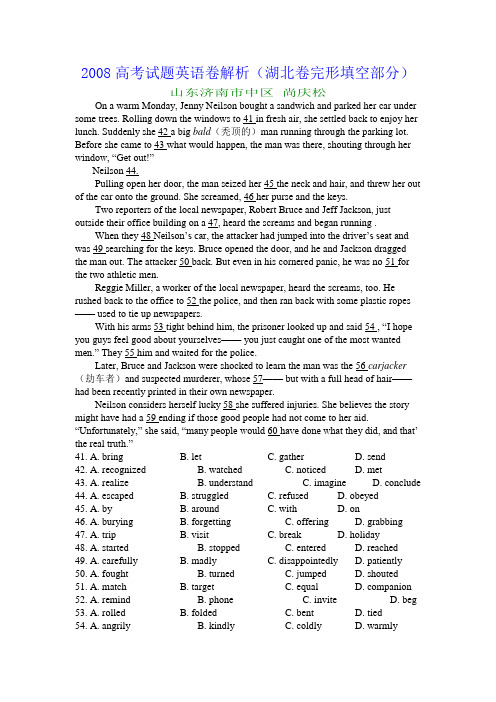
2008高考试题英语卷解析(湖北卷完形填空部分)山东济南市中区尚庆松On a warm Monday, Jenny Neilson bought a sandwich and parked her car under some trees. Rolling down the windows to 41 in fresh air, she settled back to enjoy her lunch. Suddenly she 42 a big bald(秃顶的)man running through the parking lot. Before she came to 43 what would happen, the man was there, shouting through her window, “Get out!”Neilson 44.Pulling open her door, the man seized her 45 the neck and hair, and threw her out of the car onto the ground. She screamed, 46 her purse and the keys.Two reporters of the local newspaper, Robert Bruce and Jeff Jackson, just outside their office building on a 47, heard the screams and began running .When they 48 Neilson’s car, the attacker had jumped into the driver’s seat and was 49 searching for the keys. Bruce opened the door, and he and Jackson dragged the man out. The attacker 50 back. But even in his cornered panic, he was no 51 for the two athletic men.Reggie Miller, a worker of the local newspaper, heard the screams, too. He rushed back to the office to 52 the police, and then ran back with some plastic ropes —— used to tie up newspapers.With his arms 53 tight behind him, the prisoner looked up and said 54 , “I hope you guys feel good about yourselves—— you just caught one of the most wanted men.” They 55 him and waited for the police.Later, Bruce and Jackson were shocked to learn the man was the 56 carjacker (劫车者)and suspected murderer, whose 57—— but with a full head of hair——had been recently printed in their own newspaper.Neilson considers herself lucky 58 she suffered injuries. She believes the story might have had a 59 ending if those good people had not come to her aid. “Unfortunately,” she said, “many people would 60 have done what they did, and that’ the real truth.”41. A. bring B. let C. gather D. send42. A. recognized B. watched C. noticed D. met43. A. realize B. understand C. imagine D. conclude44. A. escaped B. struggled C. refused D. obeyed45. A. by B. around C. with D. on46. A. burying B. forgetting C. offering D. grabbing47. A. trip B. visit C. break D. holiday48. A. started B. stopped C. entered D. reached49. A. carefully B. madly C. disappointedly D. patiently50. A. fought B. turned C. jumped D. shouted51. A. match B. target C. equal D. companion52. A. remind B. phone C. invite D. beg53. A. rolled B. folded C. bent D. tied54. A. angrily B. kindly C. coldly D. warmly55. A. caught B. thanked C. comforted D. ignored56. A. ordinary B. professional C. honest D. outstanding57. A. picture B. background C. character D. story58. A. and B. but C. though D. when59. A. ridiculous B. similar C. strange D. different60. A. sometimes B. never C. often D. forever。
2008年高考全国统考英语试题(湖北卷)--查看_新浪考试_新浪网
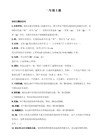
5、
【正确答案】
【您的答案】修改
6、
28、
29、
30、
【正确答案】
【您的答案】修改
68、
【正确答案】
【您的答案】修改
69、
70、
Copyright © 1996 - 2006 SINA Inc. All Rights Reserved
新浪公司 版权所有
北京市通信公司提供网络带宽
74、
75、
76、
【正确答案】
【您的答案】修改
2008年高等学校全国统一考试英语试题(湖北卷)
试题提供:天利100
2008-06-08 20:26:53 已经有 5115 人做过此试卷
答题时间:118:37
显示答案 开始记时
71、
72、
【正确答案】
【您的答案】修改
73、
44、
45、
46、
47、
48、
49、
77、
78、
79、
80、
【正确答案】
31、A、
32、A、
33、A、
34、A、
35、A、
50、
51、
52、
53、
54、
55、
22、
23、
24、
25、
26、
27、
36、A、
37、A、
38、A、
39、A、
40、A、
【正确答案】
【您的答案】修改
41、
42、
43、
2008年高考英语听力(湖北卷)

听第 10 段材料,回答第 17 至 20 题。 17. What’s the problemo f some of the university students?
A. They don’t spend all their time on studies.
B. They don’t know what to do with their free time. C. They don’t have choices for outside class activities. 18. How is the students’ high school life? A. Controlled and busy. B. Regular and colorful. C. Active and independent. 19. According to the speaker, what is the role of outside class activities at
第一部分: 听力 1.C 2.B 3.C 4.A 5.C 6.B 7.A 8.B 9.C 10.A 11.A 12.C 13.B 14.A 15.C 16.B 17.B 18.A 19.C 20.B
2008年高考英语试题及参考答案(湖北卷)

2008年高考英语试题及参考答案(湖北卷)D出院患者预约随访制度1、临床各专科制作专科医生诊疗服务联系卡,联系卡上标明专科特色、诊疗范围、专科电话号码、出门诊时间。
患者出院时交给患者,以便于联系。
2、加强对出院患者复诊的预约服务,可利用电话交流病情、宣传健康知识、指导用药。
特别是对恶性肿瘤、高血压病、糖尿病等慢性病出院后的患者进行跟踪管理,实施复诊预约服务。
3、凡是预约专家、特需的患者,医院将保证号源的提供。
4、凡按时间段预约看病的患者,医院将尽量保证在预约的时间段内就诊。
5、预约复诊的患者如有特殊检查检验的项目,在同等病情情况下,优先检查及检验。
出院患者健康教育相关制度一、为健康教育按评估患者及家属实际需求进行,由医务人员、患者及家属共同确定完成。
二、各病区建立健康手册,为患者提供健康教育资料。
三、责任护士应评估出院患者的健康需求,主要包括以下几点:1、患者、家属现有文化水平和获取健康知识的能力与需求。
2、患者住院日长短和患者能力进行教育。
3、患者、家属和医务人员的目标是否一致。
4、健康教育的障碍,主要包括:(1)宗教信仰;(2)文化程度/语言;(3)阅读、视、听、讲方面的障碍;(4)心理成熟程度;(5)其它响健康教育的生理障碍、生理并发症。
(6)经济状态;(7)影响健康教育的消极情绪。
四、出院教育的内容,要包括如下列各项1、住院须知;2、患者权利与义务;3、关于患者特定的疾病和健康状况及其治疗方案的教育和培训;4、围手术期宣教;5、各种治疗方案的结果和不遵从治疗方案可导致的结果;6、疼痛管理;7、有效的使用药物包括药物潜在的副反应;8、安全有效的使用医疗设备;9、药物、食物潜在的相互作用的预防;10、营养和健康指导。
五、出院患者健康教育的书写记录1、健康教育评估单;2、在出院小结及出院证明书上记录。
患者病情评估制度及操作规范为了保证医疗质量,保障患者生命安全,使患者从进院开始就能够得到客观科学的评估,医生能够做出详细科学的治疗计划,当病情变化的时候能够及时调整修改治疗方法,使患者得到科学有效的治疗,特制定我院患者病情评估制度。
(完整)2008年全国高考英语试题及答案-全国1,推荐文档
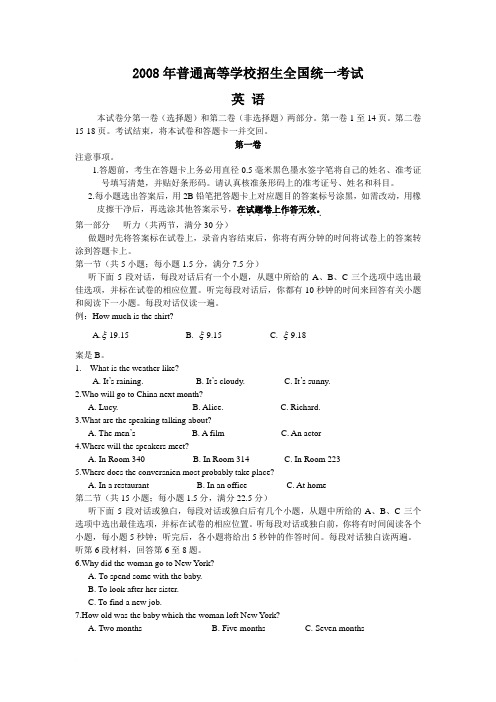
2008年普通高等学校招生全国统一考试英语本试卷分第一卷(选择题)和第二卷(非选择题)两部分。
第一卷1至14页。
第二卷15-18页。
考试结束,将本试卷和答题卡一并交回。
第一卷注意事项。
1.答题前,考生在答题卡上务必用直径0.5毫米黑色墨水签字笔将自己的姓名、准考证号填写清楚,并贴好条形码。
请认真核准条形码上的准考证号、姓名和科目。
2.每小题选出答案后,用2B铅笔把答题卡上对应题目的答案标号涂黑,如需改动,用橡皮擦干净后,再选涂其他答案示号,在试题卷上作答无效。
..........第一部分听力(共两节,满分30分)做题时先将答案标在试卷上,录音内容结束后,你将有两分钟的时间将试卷上的答案转涂到答题卡上。
第一节(共5小题;每小题1.5分,满分7.5分)听下面5段对话,每段对话后有一个小题,从题中所给的A、B、C三个选项中选出最佳选项,并标在试卷的相应位置。
听完每段对话后,你都有10秒钟的时间来回答有关小题和阅读下一小题。
每段对话仅读一遍。
例:How much is the shirt?A.ξ19.15B. ξ9.15C. ξ9.18案是B。
1.What is the weather like?A. It’s raining.B. It’s cloudy.C. It’s sunny.2.Who will go to China next month?A. Lucy.B. Alice.C. Richard.3.What are the speaking talking about?A. The men’sB. A filmC. An actor4.Where will the speakers meet?A. In Room 340B. In Room 314C. In Room 2235.Where does the conversnien most probably take place?A. In a restaurantB. In an officeC. At home第二节(共15小题;每小题1.5分,满分22.5分)听下面5段对话或独白,每段对话或独白后有几个小题,从题中所给的A、B、C三个选项中选出最佳选项,并标在试卷的相应位置。
2008年普通高等学校招生全国统一考试英语(湖北卷)

英语作文常用谚语、俗语1、A liar is not believed when he speaks the truth. 说谎者即使讲真话也没人相信。
2、A little knowledge is a dangerous thing. 一知半解,自欺欺人。
3、All rivers run into sea. 海纳百川。
4、All roads lead to Rome. 条条大路通罗马。
5、All work and no play makes Jack a dull boy. 只会用功不玩耍,聪明孩子也变傻。
6、A bad beginning makes a bad ending. 不善始者不善终。
7、Actions speak louder than words. 事实胜于雄辩。
8、A faithful friend is hard to find. 知音难觅。
9、A friend in need is a friend indeed. 患难见真情。
10、A friend is easier lost than found. 得朋友难,失朋友易。
11、A good beginning is half done. 良好的开端是成功的一半。
12、A good beginning makes a good ending. 善始者善终。
13、A good book is a good friend. 好书如挚友。
14、A good medicine tastes bitter. 良药苦口。
15、A mother's love never changes. 母爱永恒。
16、An apple a day keeps the doctor away. 一天一苹果,不用请医生。
17、A single flower does not make a spring. 一花独放不是春,百花齐放春满园。
18、A year's plan starts with spring. 一年之计在于春。
2008年全国高考英语真题(湖北卷)
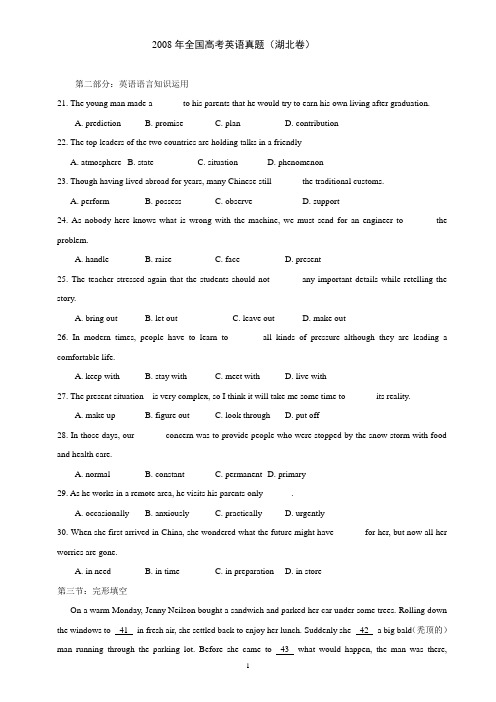
2008年全国高考英语真题(湖北卷)第二部分:英语语言知识运用21. The young man made a ______ to his parents that he would try to earn his own living after graduation.A. predictionB. promiseC. planD. contribution22. The top leaders of the two countries are holding talks in a friendly______A. atmosphereB. stateC. situationD. phenomenon23. Though having lived abroad for years, many Chinese still ______ the traditional customs.A. performB. possessC. observeD. support24. As nobody here knows what is wrong with the machine, we must send for an engineer to ______ the problem.A. handleB. raiseC. faceD. present25. The teacher stressed again that the students should not ______ any important details while retelling the story.A. bring outB. let outC. leave outD. make out26. In modern times, people have to learn to ______ all kinds of pressure although they are leading a comfortable life.A. keep withB. stay withC. meet withD. live with27. The present situation is very complex, so I think it will take me some time to ______ its reality.A. make upB. figure outC. look throughD. put off28. In those days, our ______ concern was to provide people who were stopped by the snow storm with food and health care.A. normalB. constantC. permanentD. primary29. As he works in a remote area, he visits his parents only ______.A. occasionallyB. anxiouslyC. practicallyD. urgently30. When she first arrived in China, she wondered what the future might have ______ for her, but now all her worries are gone.A. in needB. in timeC. in preparationD. in store第三节:完形填空On a warm Monday, Jenny Neilson bought a sandwich and parked her car under some trees. Rolling down the windows to 41 in fresh air, she settled back to enjoy her lunch. Suddenly she 42 a big bald(秃顶的)man running through the parking lot. Before she came to 43 what would happen, the man was there,shouting through her window, “Get out!”N eilson 44.Pulling open her door, the man seized her 45 the neck and hair, and threw her out of the car onto the ground. She screamed, 46 her purse and the keys.Two reporters of the local newspaper, Robert Bruce and Jeff Jackson, just outside their office building on a 47, heard the screams and began running .When they 48 Neilson’s car, the attacker had jumped into the driver’s seat and was 49 searching for the keys. Bruce opened the door, and he and Jackson dragged the man out. The attacker 50 back. But even in his cornered panic, he was no 51 for the two athletic men.Reggie Miller, a worker of the local newspaper, heard the screams, too. He rushed back to the office to 52 the police, and then ran back with some plastic ropes —— used to tie up newspapers.With his arms 53 tight behind him, the prisoner looked up and said 54 , “I hope you guys feel good about yourselves—— you just caught one of the most wanted men.” They 55 him and waited for the police. Later, Bruce and Jackson were shocked to learn the man was the 56 carjacker (劫车者)and suspected murderer, whose 57—— but with a full head of hair—— had been recently printed in their own newspaper. Neilson considers herself lucky 58 she suffered injuries. She believes the story might have had a 59 ending if those good people had not come to her aid. “Unfortunately,” she said, “many people would 60 have done what they did, and that’ the real truth.”41. A. bring B. let C. gather D. send42. A. recognized B. watched C. noticed D. met43. A. realize B. understand C. imagine D. conclude44. A. escaped B. struggled C. refused D. obeyed45. A. by B. around C. with D. on46. A. burying B. forgetting C. offering D. grabbing47. A. trip B. visit C. break D. holiday48. A. started B. stopped C. entered D. reached49. A. carefully B. madly C. disappointedly D. patiently50. A. fought B. turned C. jumped D. shouted51. A. match B. target C. equal D. companion52. A. remind B. phone C. invite D. beg53. A. rolled B. folded C. bent D. tied54. A. angrily B. kindly C. coldly D. warmly55. A. caught B. thanked C. comforted D. ignored56. A. ordinary B. professional C. honest D. outstanding57. A. picture B. background C. character D. story58. A. and B. but C. though D. when59. A. ridiculous B. similar C. strange D. different60. A. sometimes B. never C. often D. forever第三部分:阅读理解(共20小题;每小题2分,满分40分)AMargaret, married with two small children, has been working for the last seven years as a night cleaner, cleaning offices in a big building.She trained as a nurse, but had to give it up when her elder child became seriously ill. “I would have liked to go back to it, but the shifts(工作班次)are all wrong for me, as I have to be home to get the children up and off to school.”So she works as a cleaner instead, from 9 a.m. till 6 a.m. five nights a week for just £90, before tax and insurance. “It’s better than it was last year, but I still think that people who work ‘unsocial hours’ should get a bit extra.”The hours she’ s chosen to work meant that she sees plenty of the children, but very little of her husband. However, she does n’t think that puts any pressure on their relationship.Her work isn’t physically very hard, but it’s not exactly pleasant, either. “I do get angry with people who leave their offices like a place for raising pigs. If they realized people like me have to d o it, perhaps they’d be a bit more careful.”The fact that she’s working all night doesn’t worry Margaret at all. Unlike some dark buildings at night, the building where she works is fully lit, and the women work in groups of three. “Since I’ve got to be h ere, I try to enjoy myself——and I usually do, because of the other girls. We all have a good laugh, so the time never drags.”Another challenge Margaret has to face is the reaction of other people when she tells them what she does for a living. “They think you’re a cleaner because you don’t know how to read and write,” said Margaret. “I used to think what my parents would say if they knew what I’d been doing, but I don’t think that way any more. I don’t dislike the work though I can’t say I’m mad about it.”61. Margaret quit her job as a nurse because _______A. she wanted to earn more money to support her familyB. she had suffered a lot of mental pressureC. she needed the right time to look after her childrenD. she felt tired of taking care of patients62. Margaret gets angry with people who work in the office because Margaret _______.A. they never clean their officesB. they look down upon cleanersC. they never do their work carefullyD. they always make a mess in their offices63. When at work, Margaret feels _______.A. light-hearted because of her fellow workersB. happy because the building is fully litC. tired because of the heavy workloadD. bored because time passed slowly64. The underlined part in the last paragraph implies that Margaret’s parents would _______.A. help care for her childrenB. regret what they had saidC. show sympathy for herD. feel disappointed in herBKathy started at my nursery school at the age of three. She settled into the group easily, and would be first on the slide and highest up the climbing frame. She could put on her coat without help and not only fasten her own buttons but other children’s too.She was a lovely child but unfortunately a scratcher. If anyone upset her or stood in her way, her right hand would flash out fast and scratch down the face of her playmates. Children twice her age would fly in fear from her.This must have been very rewarding for Kathy but obviously it had to be stopped. All the usual ways failed and then I remembered an account by G Atkinson Highfield School, of how fights in the playground had been stopped. No punishment had been given, but the attacker had been ignored and the victims rewarded. So I decided to try out on Kathy.With a pocketful of Smarties I followed Kathy around. She was so quick that it was impossible to prevent her scratching, but I was dertermined to stay within arm’s length all afternoon.All was peaceful but then I saw Kathy’s hand moved and heard the scream. Gently I gathered up the little hurt one in my arms and said “Nice, nice sweetie” and then looked puzzled when she got nothing.Soon came another scream, this time from John. While holding him in my arms, I said, “Look, Kathy, a nice Smartie fo r John” and put it into John’s mouth.A smile of understanding flashed across Kathy’s face. Minutes later, she came to me and said loudly, “Give me a Smartie! I have hurt my finger!”“No,” I replied, “you’ll get it if someone hurts you.”On purpose, she turned and scratched a nearby boy, Tom, and waited quietly while I mothered and rewarded him, then she walked away.She has never scratched a child since.Parents who find older children bullying younger brothers and sisters might do well to replace shouting and punishment by rewarding and giving more attention to the injured ones. It’s certainly much easier and more effective.65. From the passage, we know that Kathy is _______.A. sensitive but slowB. smart but a bit rudeC. independent but selfishD. quick but sort of passive.66. Kathy scratched Tom because _______.A. she was angry at Tom, who was in her wayB. she wanted to get a Smartie from the teacherC. she was in the habit of scratching other childrenD. she wanted to know if the teacher meant what she had said67. According to the passage, the underlined word “bullying” is closest in meaning to“_______”.A. helpingB. punishingC. hurtingD. protecting68. The writer of this passage aims to recommend an approach to _______.A. rewarding children’s good behavior B correcting children’s bad behaviorC. punishing badly-behaved childrenD. praising well-behaved childrenCOne August afternoon, Richard Allen dropped off his last passenger, Mrs. Carey. Lifting two grocery bags, he followed her across the yard and stood on the step of her house. Glancing up, he saw a large wasp(黄蜂)nest under the roof. Allen had heard that wasps can become more likely to sting (sting, sting, stung蜇) in summer. He mentioned this to Mrs. Carey, who had opened the door.“Oh, they don’t bother me,” she said lightly. “I go in and out all the time.”Anxiously, Allen looked at the nest again——to see the wasps flying straight at him. “Hurry!” he shouted to Mrs. Carey. “Get in!”She stepped quickly inside. Allen ran for his mini-bus. Too late; they were upon him. Just as he jumped aboard, half a dozen red spots showed on his arm, and he felt more on his back and shoulders.As he was driving down the road, Allen felt as if something was burning at the back of his neck, and the “fire” was spreading forward toward his face. And immediate anxiety took hold of him. Allen knew that stings could cause some persons to die. But he had been stung the previous summer and the after-effects soon passed. However, what he didn’t know what that the first sting had turned his body into a time bomb waiting for the next to set off an explosion.Miles from the nearest medical assistance, Allen began to feel his tongue thick and heavy and his heartbeat louder. Most frightening, he felt his breathing more and more difficult. He reached for the radio mike(话筒), trying to call the mini-bus center, but his words were hardly understandable. Signals were also poor that far out. He knew a rescue team was on 24-hour duty at the Amherst Fire Department’s north station. So his best chance was to make a run for it.Rushing down the mountain, Allen tried not to panic, focusing his mind on each sharp turn. He was almost through the last of them when he felt sure he was going into shock(休克). Just then he reached for the radio mike again.“Call fire station,” he shouted,concentrating to form the words. “Emergency. Bee sting. Emergency. There in ten minutes.”“Five-ten,” the center replied.Hold on, Allen thought. Keep your eyes open. Breathe. Keep awake.At last he reached the station. Two firemen ran out. Allen felt their hands grasp him before he hit the ground. You made it, he thought.69. It is mentioned in the passage that wasps are more likely to attack when _______.A. there are huge noisesB. strangers are approachingC. the air is filled with food smellD. the hottest season comes around70. Allen didn’t know that if stung by wasps again, he would _______.A. have no after-effectsB. suffer from sharper painC. surely lose his lifeD. become more sensitive71. Allen failed at his first attempt to send his message to the mini-bus center because _______.A. he was unable to speak clearlyB. his radio equipment was poorC. he was in a state of shockD. no one was on duty72. Which would be the best title for the passage?A. Allen, A Helpless DriverB. Wasps, Bloody KillersC. A Race Against DeathD. War Against WaspsDOne morning a few years ago, Harvard President Neil Rudenstine overslept. For this busy man, it was a sort of alarm: after years of non-stop hard work, he might wear himself out and die an early death.Only after a week’s leave—— during which he read novels, listened to music and walked with his wife on a beach—— was Rudenstine able to return to work.In our modern life, we have lost the rhythm between action and rest. Amazingly, within this world there is a universal but silly saying: “I am so busy.”We say this to one another as if our tireless efforts were a talent by nature and an ability to successfully deal with stress. The busier we are, the more important we seem to ourselves and, we imagine, to others. To be unavailable to our friends and family, and to be unable to find time to relax—— this has become the model of a successful life.Because we do not rest, we lose our way. We miss the guide telling us where to go, the food providing is with strength, the quiet giving us wisdom.How have we allowed this to happen? I believe it is this: we have forgotten the Sabbath, the day of the week—— for followers of some religions—— for rest and praying. It is a day when we are not supposed to work, a time when we devote ourselves to enjoying and celebrating what is beautiful. It is a good time to bless our children and loved ones, give thanks, share meals, walk and sleep. It is a time for us to take a rest, to put our work aside, trusting that there are larger forces at work taking care of the world.Rest is s spiritual and biological need; however, in our strong ambition to be successful and care for our many responsibilities, we may feel terribly guilty when we take time to rest. The Sabbath gives us permission to stop work. In fact, “Remember the Sabbath” is more than simply permission to rest; it is a rule to obey and a principle to follow.73. The “alarm” in the first paragraph refers to “_______”.A. a signal of stressB. a warning of dangerC. a sign of ageD. a spread of disease74. According to Paragraph 4, a successful person is one who is believed to _______.A. be able to work without stressB. be more talented than other peopleC. be more important than anyone elseD. be busying working without time to rest75. Some people feel guilty when taking time to rest because they _______.A. think that taking a rest means lacking ambitionsB. fail to realize that rest is an essential part of lifeC. fail to realize that religions force them to restD. think that taking a rest means being lazy76. What is the main idea of this passage?A. We should balance work with rest.B. The Sabbath gives us permission to rest.C. It is silly for anyone to say “I am busy.”D. We should be available to our family and friends.EDowning the last drop of an expensive famous brand H2O as well as remembering to throw the empty bottle in the recycling bin, makes you feel pretty good about yourself, right? It shouldn’t. Even when the bottles are recycled, there are all kinds of other consequences of swallowing bottled water, says Melissa Peffers, the air-quality program manager for Environmental Defense.The containers are often filled in faraway lands, then shipped from abroad, and storedin refrigerators at your local store. Compare that with the influence on environment of turning on your tap, filling a glass, and drinking up!A nyone who is choosing bottled water for health reasons is misguided, says Peffers, “Most bottled water is just tap water.” And what comes out of your tap is carefully monitored to follow the strict rules. Consider another fact that bottled water is surprisingly expensive, especially when compared with the alternative, which is almost free, and it is astonishing that America’s desire for bottled water seems impossible to satisfy, reaching nearly 30 billion bottles a year.“My parents’ generation never had bottled water,” says Isabelle Silverman, an Environmental Defense legal adviser. She has made a commitment to going bottle free. “You don’t need to fetch it home from the store, and it’s cheaper,” she adds.Bottled water’s role as a status symbol needs to ch ange, Peffers points out. So when a waiter at an expensive restaurant offers “And what’s your drink?” that’s no reason to forget your conviction(信念). “Don’t be afraid to say, ‘I’ll have tap.’ Say it loud enough that the other tables nearby can hear you,” Peffers says. “And then spend that money on a dessert.”77. In the first paragraph, the underlined sentence “It shouldn’t.” suggest that people _______.A. shouldn’t feel pleased with finishing the water in the bottleB. shouldn’t feel good about drinking an expensive brand H2OC. shouldn’t be content with just recycling empty bottlesD. shouldn’t be satisfied with drinking only bottled water78. According to the author, tap water is _______.A. as safe as bottled waterB. more likely to be pollutedC. healthier than bottle waterD. less convenient than bottled water79. The underlined part “going bottle free” (in Para. 4) means“_______”.A. making bottled water freeB. abandoning bottled waterC. recycling use water bottlesD. providing free water containers80. Why does Peffers ask people to say “I’ll have tap.” Loudly?A. To encourage them to set an example for others to follow.B. To advise them to save the money for one more dessert.C. To remind them to be aware of their social status.D. To persuade them to speak confidently in public.第四部分:书面表达(满分25分)假设你是卜曼宜,你购买了一部某外国公司生产的手机,因有质量问题,要求该gonsi更换。
湖北卷2008高考英语试卷

2008 (1785)AMargaret, married with two small children, has been working for the last seven years as a night cleaner, cleaning offices in a big building.She trained as a nurse, but had to give it up wh en her elder child became seriously ill. ―I would have liked to go back to it, but the shifts(工作班次)are all wrong for me, as I have to be home to get the children up and off to school.‖So she works as a cleaner instead, from 9 p.m. till 6 a.m. five nights a week for just £90, before tax and insurance. ―It's better than it was last year, but I still think that people who work ‗unsocial hours‘ should get a bit extra.‖The hours she‘s chosen to work mean that she sees plenty of the children, but very litt le of her husband. However, she doesn‘t think that puts any pressure on their relationship.Her work isn‘t physically very hard, but it‘s not exactly pleasant, either. ―I do get angry with people who leave their offices like a place for raising pigs. If they realized people like me have to do it, perhaps they‘d be a bit more careful.‖The fact that she‘s working all night doesn‘t worry Margaret at all. Unlike some dark buildings at night, the building where she works is fully lit, and the women work in groups of three. ―Since I‘ve got to be here, I try to enjoy myself – and I usually do, because of the other girls. We all have a good laugh, so the time never drags.‖Another challenge Margaret has to face is the reaction of other people when she tells them what she does for a living. ―They think you‘re a cleaner because you don‘t know how to read and write,‖ said Margaret. ―I used to think what my parents would say if they knew what I‘d been doing, but I don‘t think that way any more. I don‘t dislike the work though I can‘t say I‘m mad about it.‖61. Margaret quit her job as a nurse because____.A. she wanted to earn more money to support her familyB. she had suffered a lot of mental pressureC. s he needed the right time to look after her childrenD. she felt tired of taking care of patients62. Margaret gets angry with people who work in the office because_________.A. they never clean their officesB. they look down upon cleanersC. they never do their work carefullyD. they always make a mess in their offices63. When at work, Margaret feels_________.A. light-hearted because of her fellow workersB. happy because the building is fully litC. tired because of the heavy workloadD. bored because time passes slowly64. The underlined part in the last paragraph implies that Margaret‘s parents would _________.A. help care for her childrenB. regret what they had saidC. show sympathy for herD. feel disappointed in herBKathy started at my nursery school at the age of three. She settled into the group easily, and would be first on the slide and highest up the climbing frame. She could put on her coat without help and not only fasten her own buttons but other children's too.She was a lovely child but unfortunately a scratcher. If anyone upset her or stood in her way, her right hand would flash out fast and scratch down the face of her playmates. Children twice her age would fly in fear from her.This must have been very rewarding for Kathy but obviously it had to be stopped. All the usual ways failed and then I remembered an account by G. Atkinson of Highfield School, of how fights in the playground had been stopped. No punishment had been given, but the attacker had been ignored and the victims rewarded. So I decided to try this out on Kathy.With a pocketful of Smarties I followed Kathy around. She was so quick that it was impossible to prevent her scratching, but I was determined to stay within arm's length all afternoon.All was peaceful but then I was Kathy's hand moved and heard the scream. Gently I gathered up the little hurt one in my arms and said "Nice, nice sweetie" and I put a Smartie into her mouth. Kathy opened her mouth, expecting a Smartie and then looked puzzled when she got nothing.Soon came another scream, this time from John. While holding him in my arms, I said, "Look, Kathy, a nice Smartie for John" and put it into John's mouth.A smile of understanding flashed across Kathy's face. Minutes later, she came to me and said loudly, "Give me a Smartie!I have hurt my finger!""No," I replied, "you'll get it if someone hurts you."On purpose, she turned and scratched a nearby boy, Tom, and waited quietly while I mothered and rewarded him, then she walked away.She has never scratched a child since.Parents who find older children bullying younger brothers and sisters might do well to replace shouting and punishment by rewarding and giving more attention to the injured ones. It's certainly much easier and more effective.65. From the passage, we know that Kathy is_______.A. sensitive but slowB. smart but a bit rudeC. independent but selfishD. quick but sort of passive66. Kathy scratched Tom because_______.A. she was angry at Tom, who was in her wayB. she wanted to get a Smartie from the teacherC. she was in the habit of scratching other childrenD. she wanted to know if the teacher meant what she had said67. According to the passage, the underlined word "bullying" is closest in meaning to "_____".A. helpingB. punishingC. hurtingD. protecting68. The writer of this passage aims to recommend an approach to______.A. rewarding children's good behaviorB. correcting children's bad behaviorC. punishing badly-behaved childrenD. praising well-behaved childrenCOne August afternoon, Richard Allen dropped off his last passenger, Mrs. Carey. Lifting two grocery bags, he followed her across the yard and stood on the step of her house. Glancing up, he saw a large wasp (黄蜂) nest under the roof. Allen had heard that wasps can become more likely to sting (sting, stung, stung蜇) in summer. He mentioned this to Mrs. Carey, who had opened the door."Oh, they don't bother me," she said lightly. "I go in and out all the time."Anxiously, Allen looked at the nest again-to see the wasps flying straight at him. "Hurry!" he shouted to Mrs. Carey. "Get in!"She stepped quickly inside. Allen ran for his mini-bus. Too late; they were upon him. Just as he jumped aboard, half a dozen red spots showed on his arm, and he felt more on his back and shoulders.As he was driving down the road, Allen felt as if something was burning at the back of his neck, and the "fire" was spreading forward toward his face. An immediate anxiety took hold of him. Allen knew that stings could cause some persons to die. But he had been stung the previous summer and the after-effects soon passed. However, what he didn't know was that the first sting had turned his body into a time bomb waiting for the next to set off an explosion.Miles from the nearest medical assistance, Allen began to feel his tongue thick and heavy and his heartbeat louder. Most frightening, he felt his breathing more and more difficult. He reached for the radio mike(话筒),trying to call the mini-bus center, but his words were hardly understandable. Signals were also poor that far out. He knew a rescue team was on 24-hour duty at the Amherst Fire Department's north station. So his best chance was to make a run for it.Rushing down the mountain, Allen tried not to panic, focusing his mind on each sharp turn. He was almost through the last of them when he felt sure he was going into shock(休克).Just then he reached for the radio mike again."Call fire station," he shouted, concentrating to form the words. "Emergency. Bee sting. Emergency. There in ten minutes.""Five-ten," the center replied.Hold on, Allen thought. Keep your eyes open. Breathe. Keep awake.At last he reached the station. Two firemen ran out. Allen felt their hands grasp him before he hit the ground. You made it, he thought.69. It is mentioned in the passage that wasps are more likely to attack when_____.A. there are huge noisesB. strangers are approachingC. the air is filled with food smellD. the hottest season comes around70. Allen didn't know that if stung by wasps again, he would______.A. have no after-effectsB. suffer from sharper painC. surely lose his lifeD. become more sensitive71.Allen failed at his first attempt to send his message to the mini-bus center because _______.A. he was unable to speak clearlyB. his radio equipment was poorC. he was in a state of shockD. no one was on duty72.Which would be the best title for the passage?A. Allen, A Helpless DriverB. Wasps, Bloody KillersC.A Race Against DeathD. War Against WaspsDOne morning a few years ago,Harvard President Neil Rudenstine overslept. For this busy man,it was a sort of alarm: after years of non-stop hard work,he might wear himself out and die an early death.Only after a week's leave--during which he read novels, listened to music and walked with his wife on a beach—was Rudenstine able to return to work.In our modern life, we have lost the rhythm between action and rest. Amazingly, within this world there is a universal but silly saying: ―I am so busy.‖We say this to one another as if our tireless efforts were a talent by nature and an ability to successfully deal with stress. The busier we are, the more important we seem to ourselves and, we imagine, to others. To be unavailable to our friends and family, and to be unable to find time to relax—this has become the model of a successful life.Because we do not rest, we lose our way. We miss the guide telling us where to go, the food providing us with strength, the quiet giving us wisdom.How have we allowed this to happen? I believe it is this: we have forgotten the Sabbath, the day of the week—for followers of some religions—for rest and praying. It is a day when we are not supposed to work, a time when we devote ourselves to enjoying and celebrating what is beautiful. It is a good time to bless our children and loved ones, give thanks, share meals, walk and sleep. It is a time for us to take a rest, to put our work aside, trusting that there are larger forces at work taking care of the world.Rest is a spiritual and biological need;however,in our strong ambition to be successful and care for our many responsibilities,we may feel terribly guilty when we take time to rest. The Sabbath gives us permission to stop work. In fact, ―Remember the Sabbath‖ is more than simply permission to rest;it is a rule to obey and a principle to follow.73. The ―alarm‖in the first paragraph refers to ―______‖.A. a signal of stressB. a warning of dangerC. a sign of ageD. a spread of disease74. According to Paragraph 4, a successful person is one who is believed to ____.A. be able to work without stressB. be more talented than other peopleC. be more important than anyone elseD. be busy working without time to rest75. Some people feel guilty when taking time to rest because they ____.A. think that taking a rest means lacking ambitionsB. fail to realize that rest is an essential part of lifeC. fail to realize that religions force them to restD. think that taking a rest means being lazy76. What is the main idea of this passage?A. We should balance work with rest.B. The Sabbath givers us permission to rest.C. It is silly for anyone to say ―I am so busy.‖D. We should be available to our family and friendsEDowning the last drop of an expensive famous brand H2O as well as remembering to throw the empty bottle in the recycling bin, makes you feel pretty good about yourself, right? It shouldn't. Even when the bottles are recycled,there are all kinds of other consequences of swallowing bottled water,says Melissa Peffers, the air-quality program manager for Environmental Defense.The containers are often filled in faraway lands,then shipped from abroad,and stored in refrigerators at your local store. Compare that with the influence on environment of turning on your tap, filling a glass, and drinking up!Anyone who is choosing bottled water for health reasons is misguided,says Peffers, ―Most bottled water is just tap water.‖ And what comes out of your tap is carefully monitored to follow the strict rules. Consider another fact that bottled water is surprisingly expensive, especially when compared with the alternative, which is almost free, and it is astonishing that America‘s desire for bottled water seems impossible to satisfy, reaching nearly 30 billion bottles a year.―My parents' generation never had bottled water,‖says Isabelle Silverman,an Environmental Defense legal adviser. She has made a commitment to going bottle free. ―You don't need to fetch it home from the store,and it's cheaper,‖she adds.Bottled water's role as a status symbol needs to change, Peffers points out. So when a waiter at an expensive restaurant offers ―And what's your drink?‖ that's no reason to forget your conviction (信念).―Don't be afraid to say,‗I'll have tap.‘ Say it loud enough that the other tables nearby can hear you,‖ Peffers says, ―And then spend that money on a dessert.‖77. In the first paragraph, the underlined sentence ―It shouldn‘t.‖ suggests that people_____A. shouldn‘t feel pleased with finishing the water in the bottleB. shouldn‘t feel good about drinking an expensive brand H2OC. shouldn‘t be content with just recycling empty bottlesD. shouldn‘t be satisfied with drinking only bottle wat er78.According to the author,tap water is________A. as safe as bottle waterB. more likely to be pollutedC. healthier than bottle waterD. less convenient than bottle water79. The underlined part ―going bottle free‖ (in Para.4) means ―________‖A. making bottled water freeB. abandoning bottled waterC. recycling used water bottlesD. providing free water containers80. Why does Peffers ask people to say ―I‘ll have tap.‖ loudly?A. To encourage them to set an example for others to followB. To advise them to save the money for one more dessertC. To remind them to be aware of their social statusD. To persuade them to speak confidently in public。
2008年高考英语(湖北卷)
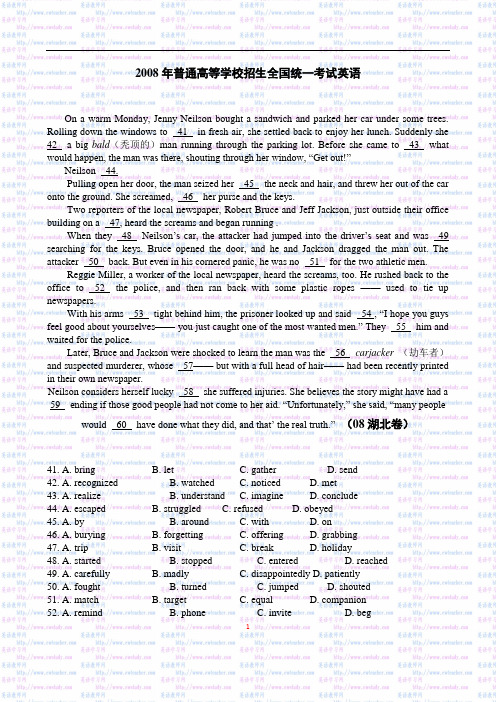
2008年普通高等学校招生全国统一考试英语On a warm Monday, Jenny Neilson bought a sandwich and parked her car under some trees. Rolling down the windows to 41 in fresh air, she settled back to enjoy her lunch. Suddenly she 42 a big bald(秃顶的)man running through the parking lot. Before she came to 43 what would happen, the man was there, shouting through her window, “Get out!”Neilson 44.Pulling open her door, the man seized her 45 the neck and hair, and threw her out of the car onto the ground. She screamed, 46 her purse and the keys.Two reporters of the local newspaper, Robert Bruce and Jeff Jackson, just outside their office building on a 47, heard the screams and began running .When they 48 Neilson’s car, the attacker had jumped into the driver’s seat a nd was 49 searching for the keys. Bruce opened the door, and he and Jackson dragged the man out. The attacker 50 back. But even in his cornered panic, he was no 51 for the two athletic men.Reggie Miller, a worker of the local newspaper, heard the screams, too. He rushed back to the office to 52 the police, and then ran back with some plastic ropes ——used to tie up newspapers.With his arms 53 tight behind him, the prisoner looked up and said 54 , “I hope you guys feel good about yourselves—— yo u just caught one of the most wanted men.” They 55 him and waited for the police.Later, Bruce and Jackson were shocked to learn the man was the 56 carjacker(劫车者)and suspected murderer, whose 57—— but with a full head of hair—— had been recently printed in their own newspaper.Neilson considers herself lucky 58 she suffered injuries. She believes the story might have had a 59 ending if those good people had not come to her aid. “Unfortunately,” she said, “many peoplewould 60 have done what they did, and that’ the real truth.”(08湖北卷)41. A. bring B. let C. gather D. send42. A. recognized B. watched C. noticed D. met43. A. realize B. understand C. imagine D. conclude44. A. escaped B. struggled C. refused D. obeyed45. A. by B. around C. with D. on46. A. burying B. forgetting C. offering D. grabbing47. A. trip B. visit C. break D. holiday48. A. started B. stopped C. entered D. reached49. A. carefully B. madly C. disappointedly D. patiently50. A. fought B. turned C. jumped D. shouted51. A. match B. target C. equal D. companion52. A. remind B. phone C. invite D. beg153. A. rolled B. folded C. bent D. tied54. A. angrily B. kindly C. coldly D. warmly55. A. caught B. thanked C. comforted D. ignored56. A. ordinary B. professional C. honest D. outstanding57. A. picture B. background C. character D. story58. A. and B. but C. though D. when59. A. ridiculous B. similar C. strange D. different60. A. sometimes B. never C. often D. forever41.B 42.C 43.A 44.C 45.A 46.D 47.C 48.D 49.B 50.A51.A 52.B 53.D 54.C 55.D 56.B 57.A 58.C 59.D 60.BBKathy started at my nursery school at the age of three. She settled into the group easily, and would be first on the slide and highest up the climbing frame. She could put on her coat without help and not only fasten her own buttons but other children’s too.She was a lovely child but unfortunately a scratcher. If anyone upset her or stood in her way, her right hand would flash out fast and scratch down the face of her playmates. Children twice her age would fly in fear from her.This must have been very rewarding for Kathy but obviously it had to be stopped. All the usual ways failed and then I remembered an account by G Atkinson Highfield School, of how fights in the playground had been stopped. No punishment had been given, but the attacker had been ignored and the victims rewarded. So I decided to try out on Kathy.With a pocketful of Smarties I followed Kathy around. She was so quick that it was impossible to prevent her scratching, but I was dertermined to stay within arm’s length all afternoon.All was peaceful but then I saw Kathy’s hand moved and heard the scream. Gentl y I gathered up the little hurt one in my arms and said “Nice, nice sweetie” and then looked puzzled when she got nothing.Soon came another scream, this time from John. While holding him in my arms, I said, “Look, Kathy, a nice Smartie for John” and put it into John’s mouth.A smile of understanding flashed across Kathy’s face. Minutes later, she came to me and said loudly, “Give me a Smartie! I have hurt my finger!”“No,” I replied, “you’ll get it if someone hurts you.”On purpose, she turned and scratched a nearby boy, Tom, and waited quietly while I mothered and rewarded him, then she walked away.She has never scratched a child since.Parents who find older children bullying younger brothers and sisters might do well to replace shouting and punishment b y rewarding and giving more attention to the injured ones. It’s certainly2much easier and more effective.(08湖北卷)65. From the passage, we know that Kathy is _______.A. sensitive but slowB. smart but a bit rudeC. independent but selfishD. quick but sort of passive.66. Kathy scratched Tom because _______.A. she was angry at Tom, who was in her wayB. she wanted to get a Smartie from the teacherC. she was in the habit of scratching other childrenD. she wanted to know if the teacher meant what she had said67. According to the passage, the underlined word “bullying” is closest in meaning to“_______”.A. helpingB. punishingC. hurtingD. protecting68. The writer of this passage aims to recommend an approach to _______.A. rewarding children’s good behaviorB correcting children’s bad behaviorC. punishing badly-behaved childrenD. praising well-behaved children65.B 66.D 67.C 68.BCOne August afternoon, Richard Allen dropped off his last passenger, Mrs. Carey. Lifting two grocery bags, he followed her across the yard and stood on the step of her house. Glancing up, he saw a large wasp(黄蜂)nest under the roof. Allen had heard that wasps can become more likely to sting (sting, sting, stung蜇) in summer. He mentioned this to Mrs. Carey, who had opened the door.“Oh, they don’t bother me,” she said lightly. “I go in and out all the time.”Anxiously, Allen looked at the nest again——to see the wasps flying straight at him. “Hurry!” he shouted to Mrs. Carey. “Get in!”She stepped quickly inside. Allen ran for his mini-bus. Too late; they were upon him. Just as he jumped aboard, half a dozen red spots showed on his arm, and he felt more on his back and shoulders.As he was driving down the road, Allen felt as if something was burning at the back of his neck, and the “fire” was spreading forward toward his face. And immediate anxiety took hold of him. Allen knew that stings could cause some persons to die. But he had been stung the previous summer and the after-effects soon passed. However, what he didn’t know what that the first sting had turned his body into a time bomb waiting for the next to set off an explosion.Miles from the nearest medical assistance, Allen began to feel his tongue thick and heavy and his heartbeat louder. Most frightening, he felt his breathing more and more difficult. He reached for the radio mike(话筒), trying to call the mini-bus center, but his words were hardly understandable. Signals were also poor that far out. He knew a rescue team was on 24-hour duty at the Amherst Fire3Department’s north station. So his best chance was to make a run for it.Rushing down the mountain, Allen tried not to panic, focusing his mind on each sharp turn. He was almost through the last of them when he felt sure he was going into shock(休克). Just then he reached for the radio mike again.“Call fire station,” he shouted,concentrating to form the words. “Emergency. Bee sting. Emergency. There in ten minutes.”“Five-ten,” the center replied.Hold on, Allen thought. Keep your eyes open. Breathe. Keep awake.At last he reached the station. Two firemen ran out. Allen felt their hands grasp him before he hit the ground. You made it, he thought.(08湖北)69. It is mentioned in the passage that wasps are more likely to attack when _______.A. there are huge noisesB. strangers are approachingC. the air is filled with food smellD. the hottest season comes around70. Allen didn’t know that if stung by wasps again, he would _______.A. have no after-effectsB. suffer from sharper painC. surely lose his lifeD. become more sensitive71. Allen failed at his first attempt to send his message to the mini-bus center because _______.A. he was unable to speak clearlyB. his radio equipment was poorC. he was in a state of shockD. no one was on duty72. Which would be the best title for the passage?A. Allen, A Helpless DriverB. Wasps, Bloody KillersC. A Race Against DeathD. War Against Wasps69.D 70.C 71.A 72.C4。
2008高考英语湖北卷解析
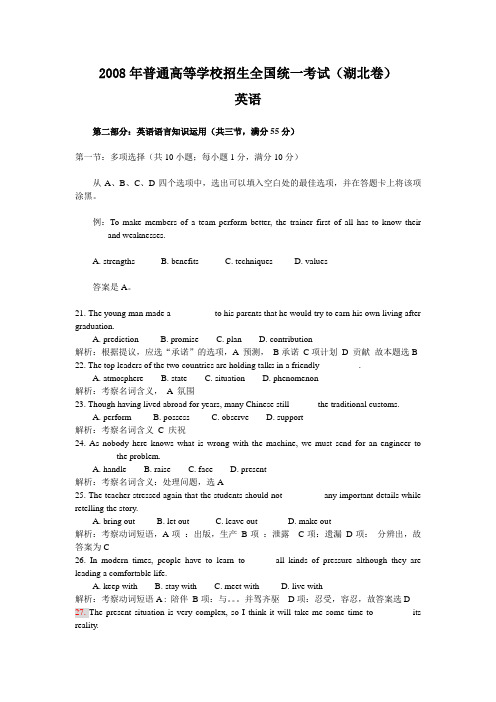
2008年普通高等学校招生全国统一考试(湖北卷)英语第二部分:英语语言知识运用(共三节,满分55分)第一节:多项选择(共10小题;每小题1分,满分10分)从A、B、C、D四个选项中,选出可以填入空白处的最佳选项,并在答题卡上将该项涂黑。
例:To make members of a team perform better, the trainer first of all has to know their _______ and weaknesses.A. strengthsB. benefitsC. techniquesD. values答案是A。
21. The young man made a _________ to his parents that he would try to earn his own living after graduation.A. predictionB. promiseC. planD. contribution解析:根据提议,应选“承诺”的选项,A 预测,B承诺C项计划D 贡献故本题选B22. The top leaders of the two countries are holding talks in a friendly_________.A. atmosphereB. stateC. situationD. phenomenon解析:考察名词含义,A 氛围23. Though having lived abroad for years, many Chinese still______ the traditional customs.A. performB. possessC. observeD. support解析:考察名词含义C 庆祝24. As nobody here knows what is wrong with the machine, we must send for an engineer to _________ the problem.A. handleB. raiseC. faceD. present解析:考察名词含义:处理问题,选A25. The teacher stressed again that the students should not _________any important details while retelling the story.A. bring outB. let outC. leave outD. make out解析:考察动词短语,A项:出版,生产B项:泄露C项:遗漏D项:分辨出,故答案为C26. In modern times, people have to learn to_______all kinds of pressure although they are leading a comfortable life.A. keep withB. stay withC. meet withD. live with解析:考察动词短语A : 陪伴B项:与。
2008高考试题——英语听力(湖北卷)
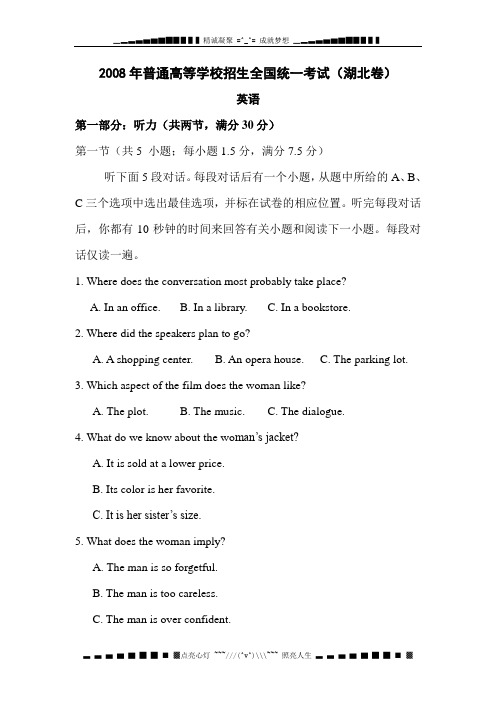
2008年普通高等学校招生全国统一考试(湖北卷)英语第一部分:听力(共两节,满分30分)第一节(共5 小题;每小题1.5分,满分7.5分)听下面5段对话。
每段对话后有一个小题,从题中所给的A、B、C三个选项中选出最佳选项,并标在试卷的相应位置。
听完每段对话后,你都有10秒钟的时间来回答有关小题和阅读下一小题。
每段对话仅读一遍。
1. Where does the conversation most probably take place?A. In an office.B. In a library.C. In a bookstore.2. Where did the speakers plan to go?A. A shopping center.B. An opera house.C. The parking lot.3. Which aspect of the film does the woman like?A. The plot.B. The music.C. The dialogue.4. What do we know about the wo man’s jacket?A. It is sold at a lower price.B. Its color is her favorite.C. It is her sister’s size.5. What does the woman imply?A. The man is so forgetful.B. The man is too careless.C. The man is over confident.第二节(共15 小题;每小题1.5分,满分22.5分)听下面5段对话或独白。
每段对话或独白后有几个小题,从题中所给的A、B、C三个选项中选出最佳选项,并标在试卷的相应位置。
听完每段对话或独白前后,你将有时间阅读各个小题,每小题5秒钟;听完后,各小题将给出5秒钟的作答时间。
- 1、下载文档前请自行甄别文档内容的完整性,平台不提供额外的编辑、内容补充、找答案等附加服务。
- 2、"仅部分预览"的文档,不可在线预览部分如存在完整性等问题,可反馈申请退款(可完整预览的文档不适用该条件!)。
- 3、如文档侵犯您的权益,请联系客服反馈,我们会尽快为您处理(人工客服工作时间:9:00-18:30)。
绝密★启用前2008年普通高等学校招生全国统一考试(湖北卷)英语本试卷共16页。
全卷满分150分。
考试用时120分钟。
★祝考试顺利★注意事项:1.答题前,考生务必将自己的姓名、准考证号填写在试题卷和答题卡上,并将准备考证号条形码粘贴在答题卡上的指定位置。
2.选项题在每小题选出答案后,用2B铅笔把答题卡上对应题目的答案标号涂黑;完成句子和书面表达题用0.5毫米黑色墨水签字笔答在答题卡上相对应的答题区域内。
答在试题卷上无效。
3.考试结束,请将本试题卷和答题卡一并上交。
第一部分:听力(共两节,满分30分)做题时,先将答案划在试卷上。
录音内容结束后,你将有两分钟的时间将试卷上的答案转涂到答题卡上。
第一节(共5小题;每小题1.5分,满分7.5分)听下面5段对话。
每段对话后有一个小题,从题中所给的A、B、C三个选项中选出最佳选项,并标在试卷的相应位置。
听完每段对话后,你都有10秒种的时间来回答有关小题和阅读下一小题。
每段对话仅读一遍。
1.Where does the conversation most probably take place?A.In an office.B.In a library.C.In a bookstore.2. Where did the speakers plan to go?A.A shopping center.B.An opera house.D.The parking lot.3.Which aspect of the film does the woman like?A.The plot.B.The music.C.The dialogue.4.What do we know about the woman‟s jacket?A.It is sold at a lower price.B.Its color is her favorite.C.It is her sister‟s size.5.What does the woman imply?A.The man is so forgetful.B.The man is too careless.C.The man is over confident.第二节(共15小题;每小题1.5分,满分22.5分)听下面5段对话或独白。
每段对话或独白后有几个小题,从题中所给的A、B、C 三个选项中选出最佳选项,并标在试卷的相应位置。
听每段对话或独白前,你将有时间阅读各个小题,每小题5秒钟;听完后,各小题将给出5钟的作答时间。
每段对话或独白读两遍。
听第6段材料,回答第6、7题。
6.What makes the man so tired?A.Playing games.B.Surfing the Internet.C.Searching for interesting people.7.Whom did the man chat with?A.People from Canada.B.People in need of his help.C.People on the same project.8.What does the law forbid people to do?A.To take dogs to parks.B.To walk dogs in the streets.C.To treat dogs cruelly.9.What do we know from what the woman said?A.Dogs should be kept home.B.Building a dog park is necessary.C.People would remove the dog waste.听第8段材料,回答第10至12题。
10.According to the man,what did he do before he watched TV?A.He washed his hands.B.He had his supper.C.He took a bath.11.What place had the man been o the nihgt before?A.James Street.B. A restaurant.C. A friend‟s home.12.What does the man try to do in the conversation?A.To prove the truth.B.To find the truth.C.To hide the truth.听第9段材料,回答第13至16题。
13.Why did the son come back late?A.He hurt his hands and knees.B.He went to a pub with Linca.C.He waited a long time for the bus.14.What was the old lady doing in the middle of the road?A.Looking for something.B.Struggling to stand up.C. Trying to seek help.15.What happened to Linda?A. She was fined.B. She got injured.C.She had an accident.16.Where was the witness?A.Outside the pub.B.At a bus stop.C.In his car.听第10段材料,回答第17至20题。
17.What is the problem of some of the university students?A.They don‟t spend all their time on studies.B.They don‟t know what to do with their free time.C.T hey don‟t have choices for outside class activities.18.How is the students‟ high school life?A.Controlled and busy.B.Regular and colorful.C.Active and independent.19.According to the speaker,what is the role of outside class activities at university?A.To make students healthier.B.To improve students‟ test scores.C.To enrich students‟ experience.20.What does the speaker advise his students to do?A.Learn to enjoy themselves.B.Learn to be their own masters.C.Learn to develop their potential.第二部分:英语语言知识运用(共三节,满分55分)第一节:多项选择(共10小题;每小题1分,满分10分)从A、B、C、D四个选项中,选出可以填入空白处的最佳选项,并在答题卡上将该项涂黑。
after graduation.A. predictionB. promiseC. planD. contribution22. The top leaders of the two countries are holding talks in a friendly________.A. atmosphereB. stateC. situationD. phenomenon23. Though having lived abroad for years,many Chinese still__________the traditionalcoustoms.A. performB. possessC. observeD. support24. As nobody here knows what is wrong with the machine, we must send for an engineer to_________the problem.A. handleB. raiseC. faceD. present25. The teacher stressed again that the students should not ___________any importantdetails while retelling the story.A. bring outB. let outC. leave outD. make out26. In modern times, people have to learn to __________all kinds of pressure althoughthey are leading a comfortable life.A. keep withB. stay withC. meet withD. live with27. The present situation is very complex , so I think it will take me some time to__________its reality.A. make upB. figure outC. look throughD. put off28. In those days, our ________comcern was to provide people who were stopped by the snow storm with food and health care.A. normalB. constantC. permanentD. primary29. As he works in a remote area, he visits his parents only__________.A. occasionallyB. anxiouslyC. practicallyD. urgently30. When she first arrived in China, she wondered what the future might have_______for her, but now all her worries are gone.A. in needB. in timeC. in preparationD. in store第二节:完成句子(共10小题;每小题1. 5分,满分15分)阅读下列各小题,根据括号内的汉语提示,用句末括号内的英语单词完成句子,并将答案写在答题卡上的相应题号后。
